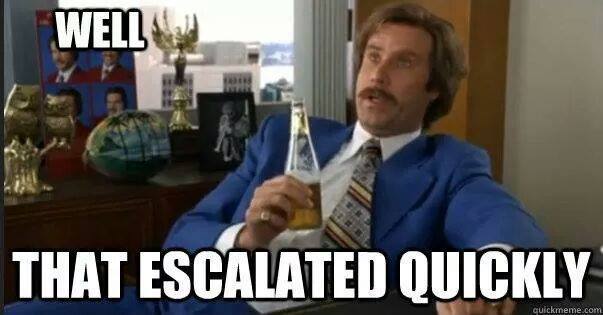Imperious Leader wrote,
Sorry but you read all the coo coo literature
The fact that someone who drank the Allied Kool Aid labels something “coo coo literature” does not make it so. Adam Tooze’s Wages of Destruction has been praised by The Times (London), The Boston Globe, The New York Sun, Financial Times, The Wall Street Journal, The Guardian, The Sunday Times, History Today, The Seattle Times, Sunday Telegraph (London). You’re going to find it extraordinarily difficult to persuade your audience that all those people are coo coos who don’t understand real history.
https://en.wikipedia.org/wiki/Blockade_of_Germany_(1939–45)
From your own link:
As 1940 drew to a close, the situation for many of Europe’s 525 million people was dire. With the food supply reduced by 15% by the blockade and another 15% by poor harvests, starvation and diseases such as influenza, pneumonia, tuberculosis, typhus and cholera were a threat.
Their only mention at Nuremberg was “they were following orders”, which were to systematically
murder entire groups of people during the entire war and years before it.
From the Wikipedia article about the Nuremberg Trials:
Chief Justice of the United States Supreme Court Harlan Fiske Stone called the Nuremberg trials a fraud. “(Chief U.S. prosecutor) Jackson is away conducting his high-grade lynching party in Nuremberg,” he wrote. “I don’t mind what he does to the Nazis, but I hate to see the pretense that he is running a court and proceeding according to common law. This is a little too sanctimonious a fraud to meet my old-fashioned ideas.”[71] . . .
Jackson, in a letter discussing the weaknesses of the trial, in October 1945 told U.S. President Harry S. Truman that the Allies themselves “have done or are doing some of the very things we are prosecuting the Germans for.” . . .
Associate Supreme Court Justice William O. Douglas charged that the Allies were guilty of “substituting power for principle” at Nuremberg. . . .
One of the charges, brought against Keitel, Jodl, and Ribbentrop included conspiracy to commit aggression against Poland in 1939. The Secret Protocols of the German-Soviet Non-Aggression Pact of 23 August 1939, proposed the partition of Poland between the Germans and the Soviets (which was subsequently executed in September 1939); however, Soviet leaders were not tried for being part of the same conspiracy.[78] Instead, the Tribunal proclaimed the Secret Protocols of the Non-Aggression Pact to be a forgery. Moreover, Allied Powers Britain and Soviet Union were not tried for preparing and conducting the Anglo-Soviet invasion of Iran and the Winter War, respectively. . . .
The trials were conducted under their own rules of evidence. The Charter of the International Military Tribunal permitted the use of normally inadmissible “evidence”. Article 19 specified that “The Tribunal shall not be bound by technical rules of evidence.” [In other words, they were free to make stuff up.] . . .
Freda Utley, in her 1949 book The High Cost of Vengeance[83] charged the court with amongst other things double standards. She pointed to the Allied use of civilian forced labor, and deliberate starvation of civilians[84][85] in the occupied territories. She also noted that General Rudenko, the chief Soviet prosecutor, after the trials became commandant of the Sachsenhausen concentration camp. . . .
The main Soviet judge, Iona Nikitchenko, presided over some of the most notorious of Joseph Stalin’s show trials during the Great Purges of 1936 to 1938, where he among other things sentenced Kamenev and Zinoviev.[88] According to the declassified Soviet archives, 681,692 people arrested for “counter-revolutionary and state crimes” were shot in 1937 and 1938 alone–an average of over 900 executions a day.[89]
The Soviet prosecutor, Roman Rudenko, later became commandant of NKVD special camp Nr. 7.[90] By the time the camp closed in the spring of 1950, at least 12,000 prisoners had died due to the catastrophic prison conditions, hunger and psychological or physical exhaustion.[91] . . .
In an editorial at the time The Economist, a British weekly newspaper, criticised the hypocrisy of both Britain and France. “Among crimes against humanity stands the offence of the indiscriminate bombing of civilian populations. Can the Americans who dropped the atom bomb and the British who destroyed the cities of western Germany plead ‘not guilty’ on this count? Crimes against humanity also include the mass expulsion of populations. Can the Anglo-Saxon leaders who at Potsdam condoned the expulsion of millions of Germans from their homes hold themselves completely innocent?”
After WWII, Britain operated a concentration camp/torture camp at Bad Nenndorf. Below is a quote from a Guardian article.
Initially, most of the detainees were Nazi party members or former members of the SS . . .
Former prisoners told Hayward that they had been whipped as well as beaten. This, the detective said, seemed unbelievable, until “our inquiries of warders and guards produced most unexpected corroboration”. Threats to execute prisoners, or to arrest, torture and murder their wives and children were considered “perfectly proper”, on the grounds that such threats were never carried out.
Moreover, any prisoner thought to be uncooperative during interrogation was taken to a punishment cell where they would be stripped and repeatedly doused in water. This punishment could continue for weeks, even in sub-zero temperatures. . . .
One victim of the cold cell punishment was Buttlar, who swallowed the spoon handle to escape. An anti-Nazi, he had spent two years as a prisoner of the Gestapo. “I never in all those two years had undergone such treatments,” he said.
If the British were willing to torture Nazi prisoners, and threaten those prisoners’ families, any confessions those prisoners made must be regarded as highly suspect. No more credible than the confessions made at Soviet show trials.







